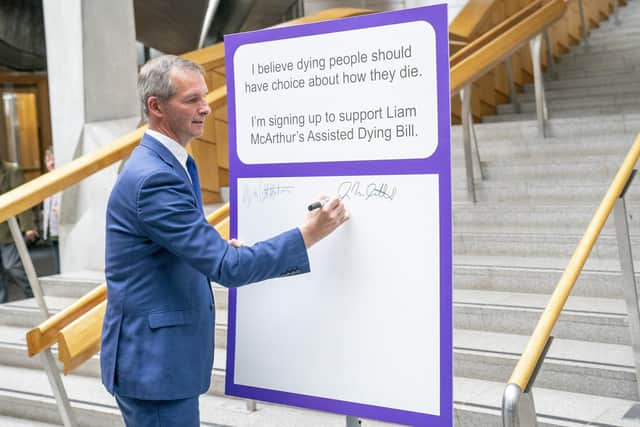Assisted dying: People with a terminal illness should not have to travel to Switzerland to end their suffering – Christine Jardine
I am not usually a fan of statistics. Too impersonal. But these past few days, one particular statistic has haunted me. At least 25 Scots have travelled to Switzerland to clinics which offer assisted dying.
I can think of few things more bleak than to feel you have to raise the money to travel to a foreign country in search of the dignity you deserve at the end of your life. But, according to the organisation Friends At the End, that is exactly what dozens of Scots, who are facing death and want the choice to end their lives, have been forced to do. I know there are many who oppose it in the strongest terms, but I cannot help but think that, when people feel their only option to exercise their final decision is to travel abroad, society has failed them.
Advertisement
Hide AdAdvertisement
Hide AdRecent pieces of research reflect a growing public consensus that the situation cannot be allowed to continue and that the choice should be available in this country. Surveys consistently support a small change in the law to support assisted dying.
In the past few weeks, the case of Scottish expat David Hunter who was released from jail in Cyprus where he had been imprisoned for helping his wife to die has highlighted another heart-breaking angle. Even for those who can afford to travel to Switzerland, there remains the fear that their decision will lead to criminal action against their family or friends if they are thought to have helped them.
For supporters of assisted dying, this seems to add to the cruelty of a situation that they regard as unfair, both to the person who wishes to die and to their loved ones. The choice is, they say, available to those who can afford it, but their families may be forced to live with the threat of legal action if they take it. For those who cannot afford it, there is no choice.
Parliamentary debates in the past have often hinged on the fear that assisted dying will develop into euthanasia and a threat to our elderly and disabled population. Or that somehow it is an alternative to palliative care.
Yet evidence from across the world shows that, where assisted dying is available and carefully regulated, this is not the case. At Westminster, the debate on whether we need a very narrow change to the law – to allow choice for those of sound mind who are facing a terminal illness and have a prognosis of only a short time left – is continuing.


But at Holyrood, my Scottish Liberal Democrat colleague Liam McArthur has been working on a private members’ bill due to be laid before parliament later this year. It is expected to enable mentally capable adults who are terminally ill to have the choice to end their life if they request it. I have written and spoken before of my own support for the principle.
I do not know what I would choose. But I would like to have, and would want others to have, that choice. When the bill comes before parliament, it will of course be an issue of conscience on which MPs will have a free vote. They will have a choice.
Christine Jardine is Scottish Liberal Democrat MP for Edinburgh West
Comments
Want to join the conversation? Please or to comment on this article.